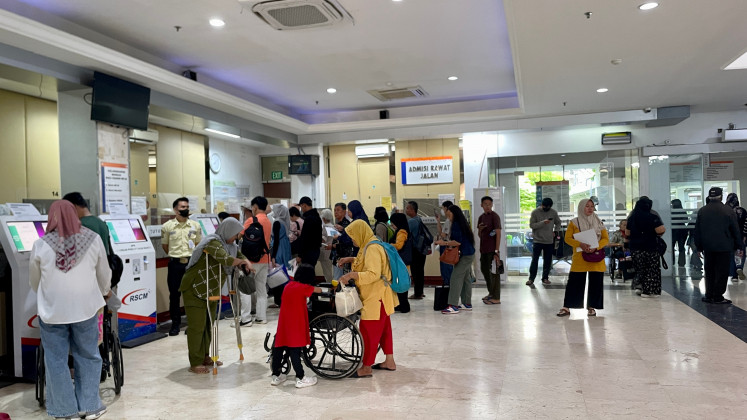Popular Reads
Top Results
Can't find what you're looking for?
View all search resultsPopular Reads
Top Results
Can't find what you're looking for?
View all search resultsTolerance treads peaceful path around ‘Benteng Chinese’ community
Cultural parade: A family (left) wearing the traditional Chio Tao outfit join a cultural parade in Tangerang, Banten, on Sept
Change text size
Gift Premium Articles
to Anyone
C
ultural parade: A family (left) wearing the traditional Chio Tao outfit join a cultural parade in Tangerang, Banten, on Sept. 8. The parade was part of the celebration for the reopening of the Tjhie Thian Tay Shen Bio Temple after it was destroyed in a fire some years ago.(JP/PJ Leo)
An afternoon view of the old boats lining the banks of the Cisadane River in Tangerang, Banten, where dozens of young kids often have an after-school swim, has become a daily routine for Renni Eddi Liem, 60, a local ferryman.
In recent years, Eddi has been busy helping residents living nearby on Jl. Kalipasir Indah to cross the river, which earns him barely enough to make ends meet for his family, let alone pay for the heart disease treatment he went through in late September.
“My heart ached a lot and my breath was heavy. It might be because of the work I had done in my younger days, melting wax and sometimes lifting big candles. Fortunately, friends came to cover the X-ray procedure I needed,” he told The Jakarta Post recently.
“I am just grateful that my fellow neighbors here from different backgrounds and social statuses can walk together hand in hand without questioning the differences. We are not just tolerating each other’s presence, but trying to get to know the cultural variants and respect them.”
Having moved out of his parents’ house in Semarang, Central Java, at the age of 26, Eddi, who is now married to a Benteng Chinese community member, claimed to have learned and absorbed the local Chinese values and traditions that his wife and her family members still upheld.
Called the Benteng Chinese [Chinese of the fort], the ethnic-Chinese people currently living there are descendants of settlers who arrived in the 15th century at the Cisadane estuary (now Teluk Naga), where a Dutch fort was situated.
The Benteng Chinese spread to various areas in Tangerang. They opened up new land in the Pasar Lama, Pasar Baru and Serpong areas, marked by the remaining evidence of three old temples, namely Boen Tek Bio, Boen San Bio and Boen Hay Bio.
Besides paddling his ferryboat, Eddi makes additional income as the keeper of Toa Pekong Air, an offering altar for Confucians located on the Cisadane’s riverbank, which is owned by the same foundation as the Boen Tek Bio temple in Pasar Lama.
“Local Chinese regularly hold their fang sen ritual here when they release living creatures such as eels, turtles, catfish and goldfish to ward off evil and pray for protection from Goddess Kwan Yin or for a smooth run of their business ventures,” said the father of four.
From his more than three decades engaging with the Benteng Chinese cultures both at home and at work, Eddi said he was grateful to have grasped the many lessons about planting good will, as well as of knowing and appreciating nature.
“Here, I learned the concepts of work, prayer and dharma [good deeds],” he said. “I witnessed many root traditions starting from my traditional chiou thau wedding ceremony, which had me and my wife wake up early in the morning and pray to the ancestors at the altar in our living room.”
Benteng Chinese elder and former Boen Tek Bio management spokesman, Oey Tjin Eng, 75, also known as Engkong Tjin Eng, said that cultural assimilation there had begun a long time ago when some Chinese women married a number of soldiers.
“The male settlers also married local women. Since then, the Benteng Chinese have been heavily influenced by local cultures, especially the Sundanese and Betawi cultures,” he said. “The pair dance cokek, for instance, is held with the accompaniment of gambang kromong [traditional Betawi ensemble] music.”
As Tangerang grew into an industrial city and many Benteng Chinese become prosperous, mainly as traders, Tjin Eng said there were still quite a number of the community members such as the boat paddlers, whose lives were far from luxurious.
Some of them work as private vehicle and public transportation drivers, or operate pedicabs that mill the streets of the city to make a living, while some others farm, sew clothes or run small food and beverage stalls, things also traditionally done by their ancestors.
Tan Teng San, a 59-year-old pedicab driver, is among those based on Jl. Kisamaun to wait patiently for customers. Pedaling with bare feet every day, the dust on the soles of his feet seems to harden between the wrinkles.
“Many years ago, my late father worked driving horse carts that carried goods, while my late mother roamed the streets to sell cakes. Now, I am riding a pedicab, while my wife sells coffee and instant noodles at home,” said Teng San.
“I have been doing this for 15 years and it used to be a quite good business before online motorcycle taxis came into power. If we’re lucky enough, we can get Rp 50,000 [US$3.50] per day. On most days, we go home empty-handed.”
Born in Jelambar, West Jakarta, to a Benteng Chinese family, Teng San met his Javanese wife, who was a jamu (traditional herbal drink) seller there. After his father’s death, together they moved back to their parents’ hometown and now have a 15-year-old son.
“Luckily, people here, including my fellow pedicab drivers that I spend most of my time with, are very inclusive. It depends on how we carry ourselves. If we respect them and what they do, they will do the same to us,” said Teng San.










